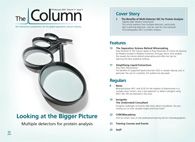The Underrated Consultant
Incognito challenges commonly held views about consultants. Are you missing out on their valuable insight and know-how?
Pages 2-7
Incognito challenges commonly held views about consultants. Are you missing out on their valuable insight and know-how?
Consultancy. What does that word mean to you? High cost? Proof you can't do your job properly? That someone is looking to outsource your job? An industry old-hand trying to see out his career working for old friends and acquaintances? They can't know anything more than you do about the context of your problem or requirement? A high price to pay to find out something you already know? Why do management always believe an outside opinion when we can give them the answers for free?

Photo Credit: John Rensten/Getty Images
Over the years I've heard all of these responses within my organization, and I've disagreed with all of them. A good consultant in analytical science ("good" is a must) can deliver great change in the minimum time for the benefit of the organization and usually the individuals within it.
Here's why I think that. Consultants usually specialize in a reasonably narrow topic or application area; however, they will have worked with a large number of clients to implement solutions or fix problems. Most important of all, they have seen how things can be done best, or most efficiently, or most successfully. While we know our relative onions with regard to our analyses and applications, how do we know it can't be done faster or more accurately or with improved performance?
I've lost count of the number of times that I've been promised a "total solution" by an instrument vendor and when the time comes to implement the method - in exactly the way I described to the salesperson - he or she is suddenly much less easy to contact than when I had the budget to spend.
When the data acquisition hardware and software and automated data analysis routines don't quite work as I had described (or in fact at all!), it has almost always been a consultant who has solved my problem. Yes, the instrument vendor will be contacted and their frontline support team will talk to their engineers who will talk to their software people and offer a solution to my highly unusual and never-seen-before application requirements (pity no one told the salesman that!), which I can implement (myself) very easily. After several iterations of this - you may get an engineer on site. You may even get to talk directly to a software person. However, the only time these problems ever really get fixed is when you meet a consultant who has seen or done this type of thing before and they inherently know the required fixes and workarounds. Often they used to work for the vendor or in industry where they achieved something very similar. I've even had them recommended to me by an instrument vendor - I couldn't publish my response!
We can't really blame the vendors though, because it is us who squeeze them so tight on margins that they can no longer afford a field-based infrastructure to support their kit. When was the last time you paid list price for any piece of equipment? And we are a mature market after all...so the kit in general is highly robust and field support isn't so necessary and can be "trimmed". Unless you are being asked to buy a service contract of course, in which case the engineer will be there within a couple of hours! Less of my cynicism, and back to the usefulness of consultants.
This really isn't me trying to beat the drum for a few old pals who got "let go" and are trying to forge a living for themselves. No, these people have time to do the research, to speak with the multiple vendors about the minutia of instrument and software design, and to work through the problems to ensure they have something to "sell" us. This, it turns out, is typically knowledge and time. Time to implement a robust working solution.
To illustrate my point, I thought it may be useful to list a few instances in which consultants of various types have helped in our organization.
Firstly to address instrument vendor relationship management. You may think that you know how to make a vendor really work for their money, how to be smart with the samples you submit for the demo, how to work with your purchasing department to get the best possible price. Great, but did you ever have a vendor develop an application for you, implement it, lend you the kit to demonstrate it working in situ (for 3 months) and then sell you it at a great, and I mean field-based infrastructure reducing-ly great, discount? Well, that's what a consultant was able to achieve on our behalf. Think of the time this saved us; we were barely involved in the process at all.
When struggling with a method which consolidated several analyses into a single "total solution", the vendor let us down badly. As usual this was in the middle of a very busy period for routine analysis and "playing" was out of the question. We handed the problem to a consultant who worked in our laboratory (completely independently - these folks are used to just getting on with it) to deliver a very satisfactory solution. Was I bothered that my management might ask why I couldn't do the job? No. My reason? After three months a very simple cost-benefit analysis showed that productivity had increased markedly, while the consolidation of the methods had cost around the price of a new printer, computer, and three software licences - all of which we got rid of as a result of the exercise.
We needed a simple software interface to make operation more straightforward for plant operatives. While the vendor could do it, we needed to produce a Design and Functional Specification for them to work from. No thanks, I've a proper job to do. It turns out our friendly software-savvy consultant could turn up, discuss what we wanted to achieve, come back with a number or proposed solutions, and then fully develop the one which worked best for us. Vendors have very few people who they can put onto bespoke software development, so they charge an absolute fortune for this type of work. Consultants tend to charge much more realistic rates and usually deliver on time, but finding one who can cover a range of data system types is like gold dust. So, if and when you do find one, be very nice to them. I may even let you borrow ours, but there is a fixers fee!
Finally, a chance conversation with a consultant at a conference about my deep suspicion and dislike of the way we did system suitability testing, led to an exercise on implementing a more QbD-/statistics-led approach to system suitability testing. I cannot tell you how much time and effort this has saved us over the past few years. Why was this possible? Because the chap had implemented something very similar when he worked in industry, not so many years ago.
Why not just employ these folks? You couldn't afford to? It would be the equivalent of taking a staff of 100 experts, of whom each worked for 20% of their working time. We don't need to do this, we just need to know the number of a good consultant.
Big business isn't always able to deliver on small detail - it's an economic fact. So who you gonna call...?
Contact author: Incognito
E-mail: admin@chromatographyonline.com
This article is from The Column. The full issue can be found here>>

A Final Word from Incognito—The Past, Present, and Future of Chromatography
February 10th 2022After 14 years in print, Incognito’s last article takes a look at what has changed over a career in chromatography, but it predominantly focuses on what the future might hold in terms of theory, technology, and working practices.
Sweating the Small Stuff—Are You Sure You Are Using Your Pipette Properly?
October 7th 2021Most analytical chemists believe their pipetting technique is infallible, but few of us are actually following all of the recommendations within the relevant guidance. Incognito investigates good pipetting practice and busts some of the urban myths behind what is probably the most widely used analytical tool.






